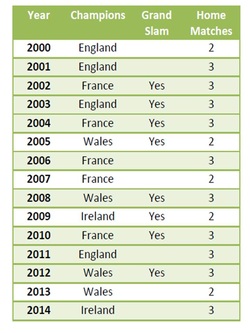
This is a tournament where the outcome has been very close very often. In each of the last three years the winner has been decided on points difference, with two or more teams having finished level on winning points. This has been the case in almost every year when there hasn't been a Grand Slam winner (where a team wins all 5 of their games). The Irish still feel the pain of losing by a points difference margin of 4 points in 2007 following a last minute try conceded against Italy and a dubious try awarded by the television match official to champions France against Scotland in the final game.
Where there are such tight margins, it is likely that home advantage could be a critical factor in success. This is backed up by a look at the winners of the tournament since it was expanded to 6 teams (and 5 matches) in 2000.

This is not good news for Ireland seeking to retain their title next year as they will have two home games (against England and France) in 2015. They can maybe look to the fact that they travel to Rome for one of those away games.
It would appear that this is simply another quirky feature of the Six Nations with which countries will have to live. The only solution is to extend the calendar and play home and away games. It is hard to see how this could fit into the packed rugby calendar. The southern hemisphere has four countries participating so a home and away style league there requires just one weekend of fixtures more that the six nations.
 RSS Feed
RSS Feed